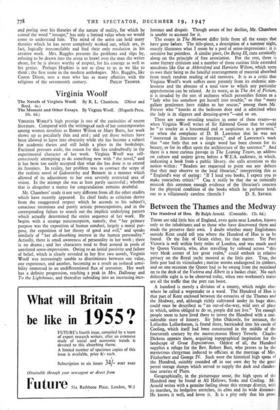Virginia Woolf
VIRGINIA WOOLF'S high prestige is one of the curiosities of recent literature. Compared with the writinghof such of her contemporaries among women novelists as Romer Wilson or Mary Butts, her work shows up as peculiarly thin and arid ; and yet those writers have been allowed to lapse into obscurity while she has become a subject for academic theses and still holds a place in the bookshops. Factional pressure aside, the reason for this lies undoubtedly in the experimental character of her work. Virginia Woolf was self- consciously attempting to do something new with "the novel," and it has been too easily accepted that what she has done is to extend its frontiers. In reality, her problem was to contract the scope of the realistic novel of Galsworthy and Bennett in a manner which allowed of its adjustment to her own severely restricted area of vision. In the attempt she was at least partly successful ; whether that is altogether a matter for congratulation remains doubtful.
Mr. Chambers' study is not very different from all the other studies which have recently appeared. Its chief faults as criticism derive from the exaggerated respect which he accords to his subject's„ conscious intentions and purely artistic preoccupations, and in the corresponding failure to search out the implicit underlying pattern which actually determined the entire sequence of her work. He begins with a strange misconception, namely, that "her primary purpose was the exposition of human conduct, largely a moral pur- pose, the exposition of her theory of good and evil," and' speaks similarly of "her all-absorbing interest in the human personality." Actually, there is small awareness of personality in her work ; there is no drama ; -and her characters tend to float around in pools of unrelated sense-impressions. Owing to an initial passivity and failure of belief, which is clearly revealed in her first two novels, Virginia Woolf was increasingly unable to discriminate between one value, one experience, and another, becoming as a result an isolated sensi- bility immersed in an undifferentiated flux of sensation. Her work has a definite progression, reaching a peak in Mrs. Dalloway and To the Lighthouse, and thereafter subsiding into an increasing inco-
herence and despair. Though aware of her decline, Mr. Chambers is unable to account for it.
The essays in The Moment differ little from all the essays that have gone before. The title-piece, a description of a summer night, exactly illustrates what I mean by a pool of sense-impressions : it is sensitive but pointless. A similar piece, On Being Ill, runs erratically along-on the principle of free association. For the rest, there is some- literary criticism and a number of those curious little extended anecdotes like Gas at Abbotsford and Harriette Wilson, which seem to owe their being to the fanciful rearrangement of material absorbed from much random reading of old memoirs. It is as a critic that Virginia Woolf's work suffers most patently from its endemic aim- lessness and the absence of a total view to which any particular apprehension can be related. At its worst, as in The Art of Fiction, it is invaded by the sort of archness which personifies fiction as a " lady who has somehow got herself into trouble," so that " many gallant gentlemen have ridden to her rescue," among them Mr. Forster who " knocks at the bedroom door and is admitted when the lady is in slippers and dressing-gown "—and so on.
There are some revealing touches in some of these essays—as when Virginia Woolf writes of Sir Edmund Gosse that he could be " as touchy as a housemaid and as suspicious as a governess," or when she complains of D. H. Lawrence that he was not " interested in literature as literature," and of Lawrence's work that "one feels that not a single word has been chosen for its beauty, or for its effect upon the architecture of the sentence." And there is a most curious passage in The Leaning Tower, an address on culture and society given before a W.E.A. audience, in which, indicating a book from a public library, she calls attention to the notice. within: " Readers are requested to point out any defects that they may observe to the local librarian," interpreting this as " England's way of saying: ` If I lend you books, I expect you to make yourselves critics.' " Can it really be that she so comically mistook this common enough evidence of the librarian's concern for the physical condition of the books which he perforce lends out to a villainously careless clientele ? D. S. SAVAGE.


































 Previous page
Previous page